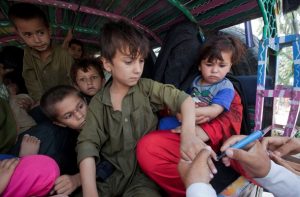
In 2014, cases of polio in Pakistan accounted for 85% of cases worldwide. In recognition of the global significance of the increase of cases in the last year, leaders across Pakistan met in November at an urgent planning meeting to establish an emergency strategy for 2015. With the low season for polio transmission approaching, there was consensus that this was an opportunity to gain control over the virus in Pakistan and to take significant action in the coming year.
Political leaders from all levels of government were joined by public health experts, partners of the polio eradication programme and community leaders from across the country. A detailed review was made of the current situation in order to develop tailored approaches for specific high risk areas of the country.
The meeting focussed on several specific issues such as improving the quality of activities in accessible areas, increasing the security measures for protecting health workers, developing special strategies for reaching mobile populations, and also using inactivated polio vaccine in areas where unvaccinated children are leaving areas of conflict. The increased focus on micro planning will be crucial in pursuing the virus into its final hiding places and ending its grip in Pakistan for good.
This evidence of increased commitment from the government of Pakistan at all levels is crucial for turning the tide on polio. The emergency activities will be directly overseen by the Office of the Prime Minister, which will monitor progress on a regular basis and redirect the plan as needed based on evolving epidemiology. In the long history of the polio eradication programme, countries that seemed to have insurmountable problems have made a dramatic turnaround following a similar commitment from their governments. The problems in Pakistan are not caused by a lack of tools, knowledge or innovation. Engagement is the key to success- from families, communities, influential figures, and governments. This meeting therefore signifies an important shift which could well indicate important changes in Pakistan.
Some very practical commitments were taken in Pakistan that should see results in the coming months. Following success in Nigeria, where only 6 cases have occurred in 2014 down from 53 the year before, Emergency Operations Centres will be set up at the federal and provincial levels in Pakistan. These will be supported by Polio Eradication Committees at the district and union-council levels. This will ensure real-time monitoring of activities, enabling rapid response to changes and the needs of local areas. In addition, the combination of vaccines given to children will be optimised in order to address both wild poliovirus and the outbreak of circulating vaccine derived poliovirus.
Polio was declared a Public Health Emergency of International Concern (PHEIC) in May under the International Health Regulations. At the meeting of the committee in November, it was concluded that Pakistan remains the only country that has exported the virus across its borders in the last 5 months. The Government of Pakistan is committed to thoroughly implementing the Temporary Recommendations made under the PHEIC for international travellers, to address this threat of international spread.
Lessons learned globally from the eradication efforts teach us that no country struggles against polio in isolation. While the virus exists anywhere, children everywhere remain at risk of paralysis. With an increase in cases in Afghanistan in the last year due to cross-border transmission from Pakistan, it is clear that the efforts made in the final strong hold of the virus will have much more broad reaching consequences for protecting children. The meeting highlighted that there will be a special focus on coordinating cross border activities between the two countries.
With the hope that the approaching months will be the last low season seen in Pakistan for wild poliovirus, supporting the transformation of plans in Pakistan into concrete steps will be one of the highest priorities for the partners of the GPEI in 2015. The Pakistan low season planning meeting further confirms that the days of this virus that once held the world in fear are numbered.



